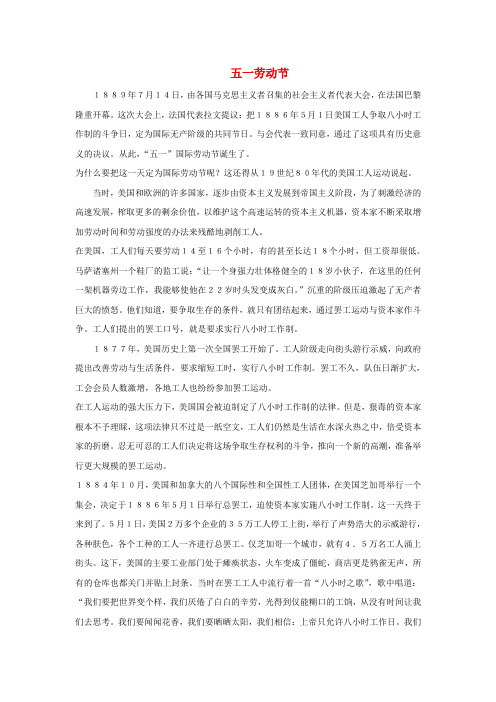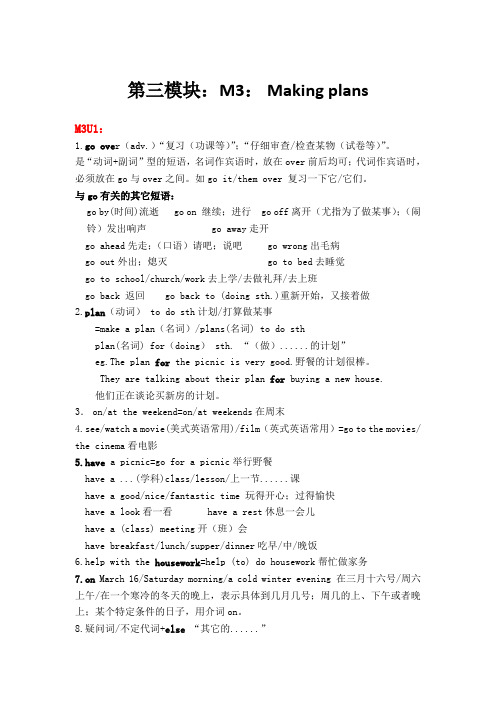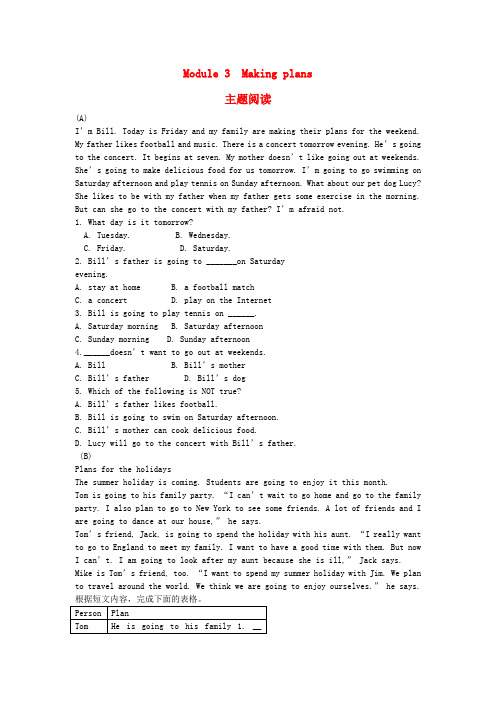(精品word)外研版七年级下册英语Module-3Making-plans知识点及练习(有答案)
- 格式:doc
- 大小:211.21 KB
- 文档页数:10

Module 3 Making plans1。
on Saturday morning 在周六上午【考点分析】辨析on , in , at 在表示时间时的区别-It ’s ________ September 10th . 【B 】A .inB .onC .atD .For②We usually have the first class________8:00 in the morning 。
【D 】A .ofB .inC .onD .at2。
else /els/adj 。
别的,其他的 adv . 另外,其他【考点分析】 else 作 时一般用在不定代词(something , anything , nobody, somebody 等)或疑问代词(who , what 等)之后;作 时一般用在不定副词(somewhere,anywhere 等)或疑问副词(where ,how 等)之后。
eg :I ’m going to take you somewhere else 。
我将要带你去别处.What else did he say ? 他还说了些什么?Where else did you go in the summer vacation ? 暑假你还去了哪儿?3。
plan /plæn/ n 。
计划,打算【考点分析】①plan 为可数名词。
常用于短语 have/make plans (for 。
....。
)意为“(为……)制订计划".eg:They made a plan for the use of their time 。
他们制订了一个利用时间的计划。
②plan 还可作动词,意为“计划,打算”,其后可接名词或动词不定式作宾语。
常用于plan to do sth 。
意为“计划/打算做某事”。
【例题】The summer holidays are coming . Xiao Li plans ________ on a visit to Hong Kong 。

五一劳动节1889年7月14日,由各国马克思主义者召集的社会主义者代表大会,在法国巴黎隆重开幕。
这次大会上,法国代表拉文提议:把1886年5月1日美国工人争取八小时工作制的斗争日,定为国际无产阶级的共同节日。
与会代表一致同意,通过了这项具有历史意义的决议。
从此,“五一”国际劳动节诞生了。
为什么要把这一天定为国际劳动节呢?这还得从19世纪80年代的美国工人运动说起。
当时,美国和欧洲的许多国家,逐步由资本主义发展到帝国主义阶段,为了刺激经济的高速发展,榨取更多的剩余价值,以维护这个高速运转的资本主义机器,资本家不断采取增加劳动时间和劳动强度的办法来残酷地剥削工人。
在美国,工人们每天要劳动14至16个小时,有的甚至长达18个小时,但工资却很低。
马萨诸塞州一个鞋厂的监工说:“让一个身强力壮体格健全的18岁小伙子,在这里的任何一架机器旁边工作,我能够使他在22岁时头发变成灰白。
”沉重的阶级压迫激起了无产者巨大的愤怒。
他们知道,要争取生存的条件,就只有团结起来,通过罢工运动与资本家作斗争。
工人们提出的罢工口号,就是要求实行八小时工作制。
1877年,美国历史上第一次全国罢工开始了。
工人阶级走向街头游行示威,向政府提出改善劳动与生活条件,要求缩短工时,实行八小时工作制。
罢工不久,队伍日渐扩大,工会会员人数激增,各地工人也纷纷参加罢工运动。
在工人运动的强大压力下,美国国会被迫制定了八小时工作制的法律。
但是,狠毒的资本家根本不予理睬,这项法律只不过是一纸空文,工人们仍然是生活在水深火热之中,倍受资本家的折磨。
忍无可忍的工人们决定将这场争取生存权利的斗争,推向一个新的高潮,准备举行更大规模的罢工运动。
1884年10月,美国和加拿大的八个国际性和全国性工人团体,在美国芝加哥举行一个集会,决定于1886年5月1日举行总罢工,迫使资本家实施八小时工作制。
这一天终于来到了。
5月1日,美国2万多个企业的35万工人停工上街,举行了声势浩大的示威游行,各种肤色,各个工种的工人一齐进行总罢工。

第三模块:M3: Making plansM3U1:1.go ove r(adv.)“复习(功课等)”;“仔细审查/检查某物(试卷等)”。
是“动词+副词”型的短语,名词作宾语时,放在over前后均可;代词作宾语时,必须放在go与over之间。
如go it/them over 复习一下它/它们。
与go有关的其它短语:go by(时间)流逝 go on 继续;进行 go off离开(尤指为了做某事);(闹铃)发出响声 go away走开go ahead先走;(口语)请吧;说吧 go wrong出毛病go out外出;熄灭 go to bed去睡觉go to school/church/work去上学/去做礼拜/去上班go back 返回 go back to (doing sth.)重新开始,又接着做2.plan(动词) to do sth计划/打算做某事=make a plan(名词)/plans(名词) to do sthplan(名词) for(doing) sth. “(做)......的计划”eg.The plan for the picnic is very good.野餐的计划很棒。
They are talking about their plan for buying a new house.他们正在谈论买新房的计划。
3.on/at the weekend=on/at weekends在周末4.see/watch a movie(美式英语常用)/film(英式英语常用)=go to the movies/ the cinema看电影5.have a picnic=go for a picnic举行野餐have a ...(学科)class/lesson/上一节......课have a good/nice/fantastic time 玩得开心;过得愉快have a look看一看 have a rest休息一会儿have a (class) meeting开(班)会have breakfast/lunch/supper/dinner吃早/中/晚饭6.help with the housework=help (to) do housework帮忙做家务7.on March 16/Saturday morning/a cold winter evening 在三月十六号/周六上午/在一个寒冷的冬天的晚上,表示具体到几月几号;周几的上、下午或者晚上;某个特定条件的日子,用介词on。

外研版七年级英语下册模块3知识点归纳Module 3: Making PlansIn this module。
we will learn some useful phrases and words related to making plans.Phrases:1.Have a ic - to go for a ic2.Check one's email - to see if there are any new emails3.Go over - to review or revise4.On Sunday morning - during Sunday morninga movie - to watch a movie6.In the park - inside the park7.Have a piano lesson - to attend a piano class8.Make friends - XXX9.Enjoy myself - to have a good time10.Go out with sb。
- to go out with someone11.Take a walk - to go for a walk12.Summer holiday - the summer break from school13.Go on a summer camp - to attend a summer camp14.Do some sightseeing - to visit tourist ns15.Look forward to sth - to be excited about something16.On the beach - at the beach17.Collect litter - to clean up XXXWords:1.On Saturday morning - during Saturday morning2.Else - other or anotherFor example。

Module 3Making plans【复习重点】1. 领会并灵活使用下列词汇:else,nothing, look forward to, hope, win, enjoy,…2. 掌握重点句型:1) be going to2) have fun doing3) enjoy oneself4). It’s time for…一般将来时的用法模块重点语法讲解:般将来时:be going to一、be going to 的用法be going to 表示将要发生的事或打算、计划要做某事。
它是一般将来时的一种表达形式,其后常有表示将来的时间状语,如,tomorrow,next week等。
构成:be going to + 动词原形。
Be 随主语人称和数的变化而变化。
注意:1)be going to 表示说话人的意图指打算、准备做的事情,这种打算通常经过预先考虑并含有已经做好某种和准备的意思,所表的行为通常被认为很可能付诸实施。
Eg :She is going to write to him.2)表示说话人的推测。
通常指有迹象表明某件事将要发生,是指即将发生或肯定要发生的事情。
常用于be sure,be afraid, believe, think后。
Eg :I think it is going to snow.二、be going to 的句型结构肯定句否定句一般疑问句特殊疑问句三、be going to 的注意事项1)there 被句型的一般将来时结构为:There is/are going to be …(注意:此句型中going to 后面的be 不能改为have)。
常用来表示将要发生某事或将要出现某物。
Eg There is going to be a football match next Saturday inour school.2). be going to 后可接表示地点的名词,表示打算去某地,但接副词时,应省去to。

Module 3 Making plans主题阅读(A)I’m Bill. Today is Friday and my family are making their plans for the weekend. My father likes football and music. There is a concert tomorrow evening. He’s going to the concert. It begins at seven. My mother doesn’t like going out at weekends. She’s going to make delicious food for us tomorrow. I’m going to go swim ming on Saturday afternoon and play tennis on Sunday afternoon. What about our pet dog Lucy? She likes to be with my father when my father gets some exercise in the morning. But can she go to the concert with my father? I’m afraid not.1. What day is it tomorrow?A. Tuesday.B. Wednesday.C. Friday.D. Saturday.2. Bill’s father is going to _______on Saturdayevening.A. stay at homeB. a football matchC. a concertD. play on the Internet3. Bill is going to play tennis on ______.A. Saturday morningB. Saturday afternoonC. Sunday morningD. Sunday afternoon4.______doesn’t want to go out at weekends.A. BillB. Bill’s motherC. Bill’s fatherD. Bill’s dog5. Which of the following is NOT true?A. Bill’s father likes football.B. Bill is going to swim on Saturday afternoon.C. Bill’s mother can cook delicious food.D. Lucy will go to the concer t with Bill’s father.(B)Plans for the holidaysThe summer holiday is coming. Students are going to enjoy it this month.Tom is going to his family party. “I can’t wait to go home and go to the family party. I also plan to go to New York to see some friends. A lot of friends and I are going to dance at our house,” he says.Tom’s friend, Jack, is going to spend the holiday with his aunt. “I really want to go to England to meet my family. I want to have a good time with them. But now I can’t. I am going to look after my aunt because she is ill,” Jack says.Mike is Tom’s friend, too. “I want to spend my summer holiday with Jim. We plan to travel around the world. We think we are going to enjoy ourselves.” he says.I’m looking forward to ___1___ to Disneyland ___2___ m y parents. We 3 going to ___4___ the plane to go there.My 5 is not good. So I’m going to ___6___ English because I am going to ___7___ some American friends. Then I’m going to lie ___8___ the beach because I want to ___9___ the sun and the sea. Then my parents and I are going to ___10___ in a hotel in San Francisco, because my parents have some friends there.1. A. go B. to go C. going D. goes2. A. in B. on C. at D. with3. A. are B. is C. am D. be4. A. take B. playC. walkD. make5. A. Chinese B. mathsC. PED. English6. A. learn B. lookC. watchD. see7. A. take B. makeC. bringD. talk8. A. at B. inC. withD. on9. A. enjoy B. seeC. listenD. hear10. A. miss B. cheerC. stayD. catch主题阅读(A) 1—5 DCDBD(B) 1. party 2. friends 3. aunt 4. ill 5. travel(C) 1—5 CDAAD 6—10 ABDAC。
Module 3 Making plansUnit 1 What are you going to do at the weekend?教材分析本节课是外研版新标准七年级(下)Module 3 Unit 1 What are you going to do at the weekend?第一课时内容,本节课以对话等形式呈现,以周末计划为主题,引导学生掌握“be going to”的表达方式,使学生在掌握语言结构的同时,增强学生的计划意识。
周末计划这一话题与同学们的生活实际联系密切,易于展开,通过例句及联系实际问答,理解并熟练准确运用这一结构。
通过本节课的学习,学生能用“be going to”结构表达自己打算或计划要做的事情。
学情分析初一学生在小学已经接触一般将来时的基本用法,be going to这一句型学生基本都能脱口而出,因此,本节课秩序简单解释构成和用法,可以把重点放在掌握单词短语和使用be going to对话这两部分。
教学目标1.语言知识目标1. 识记新单词及短语2. 学习一般将来时be going to 的意义和用法2.能力目标1.通过听说练习,提高学生的听力、口语表达能力及交流合作能力。
2.能听懂包含计划的对话,判断对方的计划3.能用be going to表达自己或询问别人的计划和打算3.情感目标通过学习用英语谈论周末计划以提高学生学习英语的兴趣,培养学生有目的、有计划的去做事,并养成良好的有计划的生活和学习习惯,成为一个富有爱心的人。
重点和难点1.一般将来时be going to的构成和用法2.从短文中获取有效信息,掌握单词和表达活动的短语句子。
教学策略的选择与设计充分发挥学生主体和教师主导作用,课堂上采取生生互动、师生互动的教学策略。
精心设计课堂环节,选择既有启发性又能激起学生探讨兴趣的系列问题, 可以启迪学生动脑, 激发学生思维,培养学生主动学习的习惯。
教师设计问题时,紧扣教材, 层层推进, 要具有一定的思想梯度。
Module 3 Making plans Unit 3 languge in sue.班级组名姓名【课型】复习课【学习目标】1.学生能能用be going to 表达周末打算做的事情;2.牢记本单元的单词、词组;3.会读本模块的音标:[ ai ], [ I ], [ i: ]【重点与难点】be going to do的用法一、自主先学1. Talk about your group diary to the whole class.(整个组一起讨论将去干什么,并且确定组内每个成员打算做的活动。
制定好计划后,写成文字,然后各个组相互交换、学习、讨论,比一比)On Saturday, we are going to …2. 完成书本中的习题Activity2&3二、师生合作1.Revise the dialoguesWhat’re you going to do tomorrow?What’s he/she going to do tomorrow?What’re they going to do tomorrow?Are you going to … tomorrow?Is he/she going to … tomorrow?Are they going to … tomorrow?…三、生生合作1. Read the passage, then answer questionsOn Saturday morning, Daming is going to check his email because he makes a new friend. Then he’s going to do his homework. On Saturday afternoon, he’s going to do cleaning at home with his mother. He likes a clean and tidy house. On Saturday evening, he’s going to see a movie with his friend Tony at Sun Cinema. They are going there by bike. They like watching movies.①What’s Daming going to do on Saturday morning?②Why is Daming going to check his email?③When is Daming going to see a film?④Who is Daming going to do cleaning with?⑤Where is Daming going to see a movie?⑥How are they going to see a movie?四、真情体验1. 阅读U2的课文,对A,B,C三段文章设计尽可能多的问题:A: Questions:B: Questions:C: Questions:3. 课后反思:对于本模块的学习,还存在哪些疑惑?。
Module 3 Making plans 重点词汇讲解1.on Saturday morning在周六上午【考点分析】辨析on, in, at在表示时间时的区别on表示在具体的某一天或具体某一天的上午、下午或晚上。
on May Day在五一劳动节;on Sunday afternoon在周日下午in后跟年、月、季节、世纪,或泛指的上午、下午或晚上等。
in 1997 在1997年;in May 在五月;in the morning在早上at表示在具体的几点钟at five o’clock 在五点;at half past six 在6:30;at a quarter past two 在2:15【例题】①—Hi,Susan,when is Teachers’Day in China?—It’s ________ September 10th . 【B】A.in B.on C.at D.For②We usually have the first class________8:00 in the morning . 【D】A.of B.in C.on D.at2.else/els/adj . 别的,其他的adv . 另外,其他【考点分析】else作形容词时一般用在不定代词(something, anything, nobody, somebody等)或疑问代词(who, what等)之后;作副词时一般用在不定副词(somewhere,anywhere等)或疑问副词(where,how等)之后。
eg:I’m going to take you somewhere else . 我将要带你去别处。
What else did he say?他还说了些什么?Where else did you go in the summer vacation?暑假你还去了哪儿?3.plan /plæn/ n.计划,打算【考点分析】①plan 为可数名词。
常用于短语have/make plans(for ...... )意为“(为……)制订计划”。
eg:They made a plan for the use of their time . 他们制订了一个利用时间的计划。
②plan还可作动词,意为“计划,打算”,其后可接名词或动词不定式作宾语。
常用于plan to do sth .意为“计划/打算做某事”。
【例题】The summer holidays are coming . Xiao Li plans ________ on a visit to Hong Kong . 【A】A.to go B.go C.going4.[高频]nothing /'nʌθɪŋ/pron . 没有什么;没有东西【考点分析】①nothing是复合不定代词,作主语时,谓语动词用单数形式。
eg:Nothing is easy for him . 对他来说,没有什么是容易的。
②被形容词修饰时,形容词常放在其后,作后置定语。
eg:There is nothing wrong with the machine . 这机器没出什么毛病。
类似于nothing 的复合不定代词有:something,somebody,someone(常用于肯定句);anything,anybody, anyone(常用于否定句或疑问句);everything, everybody, everyone等。
【例题】There is ________ in today’s homework . 【C】A.difficult nothing B.difficult anything C.nothing difficult D.anything difficult5.alone /ə'ləʊn/ adv .独自地;单独地【考点分析】alone用作副词,但也可作形容词,意为“独自的”。
alone只表示“单独”的客观状态,没有感情色彩。
【拓展】lonely用作形容词,意为“孤独的,寂寞的”,带有感情色彩。
6.[高频]look forward to盼望,期待【考点分析】①look forward to后跟名词(短语)或代词。
eg:Your mother is looking forward to your letter . 你妈妈正期待着你的来信。
②look forward to中to为介词,后跟动名词。
eg:Yunnan is beautiful and I’m looking forward to visiting it again . 云南很美,我正期待着再次参观它。
【例题】学生们都期待着在这次考试中取得好成绩。
The students are all looking _____________ to ___________ well in this exam . 【forward;doing】They are looking forward to __________ (win) the first prize in the coming competition . 【winner】7.make friends交朋友【考点分析】当表示和某人交朋友时,用make friends with sb . ,其中friends不可为单数。
eg:He likes to make friends with others . 他喜欢跟别人交朋友。
8.wear /weə(r)/ v.穿,戴;留(胡须等)【考点分析】in, put on, wear, dress, have on都含有“穿”之意,但用法不同。
in 介词,后接表示衣服或颜色的词。
He is in a black nylon jacket today . 今天他穿着黑色尼龙夹克。
put on “穿上、戴上”,强调“穿、戴”的动作,后接衣服、鞋帽等。
Put on your heavy coat if you go out .如果你出去,穿上你的厚外套。
wear “穿着;戴着”,表示状态,宾语可以是衣帽,也可以是饰物、奖章等。
Why does he often wear dark sunglasses?他为什么经常戴着深色的太阳镜?dress 宾语通常是人,意思是“给……穿衣服”。
dressoneself 或get dressed表示给……穿衣服。
My son is now able to dress himself .我儿子现在自己会穿衣服了。
have on 表示“穿着,戴着”。
不能用于进行时。
I’ll have black pants and a grey shirt ontomorrow . 明天我会穿黑色的长裤和一件灰色的衬衫。
总结:put on表真动作;现在状态wear说。
in加衣鞋或颜色;状态动作dress。
【例题】Many girls would like to ________ skirts in summer .A.put on B.dress C.have in D.wear9.hope/həʊp/v . 希望【考点分析】①hope to do sth . 意为“希望做某事”,不能用hope sb. to do sth .的结构,而wish可用于固定结构wish sb. to do sth. 中,表示“希望某人做某事”。
eg:My brother hopes to go to school by bike . 我的弟弟希望骑自行车上学。
What do you wish me to do?你想要我做什么?②hope+that从句,意为“希望……”。
eg:I hope that they can finish the work . 我希望他们可以完成这份工作。
③当你要表示“希望如此。
”时,就说“I hope so .”,其否定形式用“I hope not . ”。
【例题】She said she hoped ________ her daughter . 【A】A.to see B.you to see C.seeing10.win/wɪn/ v.(过去式won)赢;获胜【考点分析】win的名词形式为winner获胜者,优胜者辨析win与beatwin 后面通常接比赛、辩论、战斗或奖品等作宾语,不能跟表示人的词I won the match.我赢得了比赛。
beat 后面接比赛、辩论或战斗的对象作宾语,即宾语通常是人或队We beat their team by 10 points . 我们赢了他们队十分。
【例题】The Chinese national women’s badminton team ________the Japanese team by 3:1 in India on May 24 . 【C】A.won B.lost C.beat D.missed11.enjoy oneself过得愉快【考点分析】①enjoy oneself中的oneself需要随着主语人称的变化而变化。
它的同义短语:have a good time玩得开心,have fun玩得高兴。
eg:He enjoys himself in China . =He has a good time in China . =He has fun in China .他在中国玩得很开心。
②enjoy常用作及物动词,意思是“喜欢”、“乐于”、“享受……的乐趣”。
enjoy后接名词或代词。
enjoy后面也可接动词的ing形式。
【例题】The five boys attended a birthday party last Sunday and they enjoyed ____________ (they)very much .【themselves】12. during /'djʊərɪŋ/ prep . 在……期间【考点分析】辨析during和induring 表示一段时间,起止分明,其谓语动词强调动作或状态的持续性,且常用在季节名词前,与定冠词the连用。
We shall be in London during the summer . 夏季我们将在伦敦。
in 泛指某一动作发生在某一时间段内,且in 用在季节名词前,有无定冠词均可。
They usually go on holiday in winter, but last year they went on holiday in summer . 他们通常在冬天去度假,可是去年他们是在夏天去度的假。